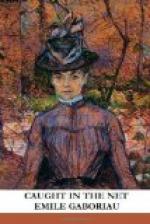“With your entrance into my life,” continued the Count, “came shame and misfortune. When people saw you so gay and careless under the oak-trees of your ancestral home, who could have suspected that your heart contained a dark secret? When my only wish was to win you for my wife, how did I know that you were weaving a hideous conspiracy against me? Even when so young, you were a monster of dissimulation and hypocrisy. Guilt never overshadowed your brow, nor did falsehood dim the frankness of your eyes. On the day of our marriage I mentally reproached myself for any unworthiness. Wretched fool that I was, I was happy beyond all power of expression, when you, madame, completed the measure of your guilt by adding infidelity to it.”
“It is false,” murmured the Countess. “You have been deceived.”
M. de Mussidan laughed a grim and terrible laugh.
“Not so,” answered he; “I have every proof. This seems strange to you, does it? You have always looked upon me as one of those foolish husbands that may be duped without suspicion on their parts. You thought that you had placed a veil over my eyes, but I could see through it when you little suspected that I could do so. Why did I not tell you this before? Because I had not ceased to love you, and this fatal love was stronger than all honor, pride, and even self-respect.” He poured out this tirade with inconceivable rapidity, and the Countess listened to it in awe-struck silence. “I kept silence,” continued the Count, “because I knew that on the day I uttered the truth you would be entirely lost to me. I might have killed you; I had every right to do so, but I could not live apart from you. You will never know how near the shadow of death has been to you. When I have kissed you, I have fancied that your lips were soiled with the kisses of others, and I could hardly keep my hands from clutching your ivory neck until life was extinct, and failed utterly to decide whether I loved you or hated you the most.”
“Have mercy, Octave! have mercy!” pleaded the unhappy woman.
“You are surprised, I can see,” answered he, with a dark smile; “yet I could give you further food for wonder if I pleased, but I have said enough now.”
A tremor passed over the frame of the Countess. Was her husband acquainted with the existence of the letters? All hinged upon this. He could not have read them, or he would have spoken in very different terms, had he known the mystery contained in them.
“Let me speak,” began she.
“Not a word,” replied her husband.
“On my honor—”
“All is ended; but I must not forget to tell you of one of my youthful follies. You may laugh at it, but that signifies nothing. I actually believed that I could gain your affection. I said to myself that one day you would be moved by my deep passion for you. I was a fool. As if love or affection could ever penetrate the icy barriers that guarded your heart.”




